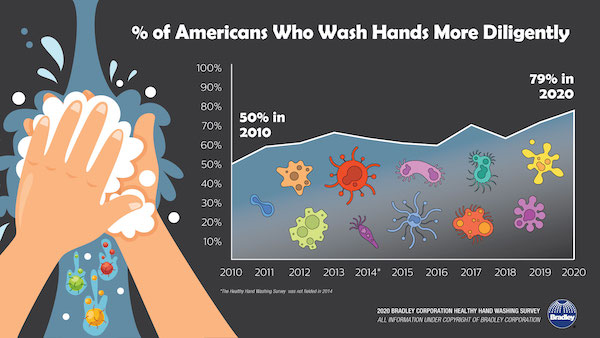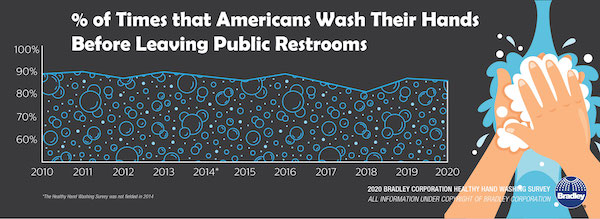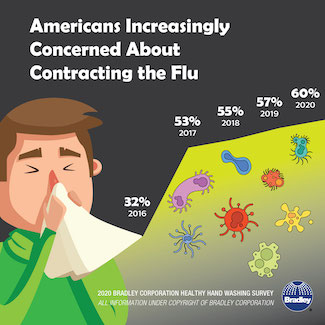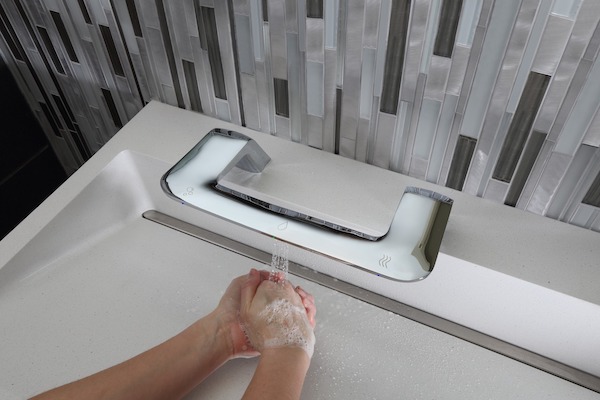News coverage, signage and restroom preparedness prompt hand washing behavior If there is some good news in the age of coronavirus, research from the Healthy Hand Washing Survey shows that during the past 11 years an increasing number of Americans are heeding the message about washing their hands to protect themselves from flu outbreaks. The Read more
restroom behavior
News coverage, signage and restroom preparedness prompt hand washing behavior
If there is some good news in the age of coronavirus, research from the Healthy Hand Washing Survey shows that during the past 11 years an increasing number of Americans are heeding the message about washing their hands to protect themselves from flu outbreaks. The question then becomes: Are facilities equipped to support hand washing as people return to their regular public activities?
11-year uptick in U.S. hand washing habits
In 2009, the year H1N1 hit the United States, only 45% of Americans said they washed their hands more frequently or thoroughly in response to flu virus outbreaks. By 2019, the number of flu-fighting hand washers in the U.S. had risen to 79%.

A national focus on outbreaks does have an affect on hand hygiene. 50% of Americans say news coverage of cold and flu outbreaks has a “very large” or “somewhat large” impact on their hand washing behavior. Women and their hand washing habits are more likely to be impacted by news coverage than men (53% vs. 47%).
“The steady rise in hand washing diligence in America may, in part, stem from several stand-out flu seasons over the past decade – particularly flu outbreaks in 2009, 2015 and 2018,” says Jon Dommisse, director of strategy and corporate development for Bradley Corp. “Now, the unprecedented spread of coronavirus has placed an even more intense spotlight on the critical nature of thorough hand washing with soap and water for at least 20 seconds.

“Hand washing in public facilities will be exceedingly important in the coming weeks and months as people return to workplaces, offices, schools, restaurants, stores and other gathering places,” Dommisse said. “It’s essential we take advantage of every opportunity to wash our hands whether we are at home or in public.”
 Hand washing in a new era
Hand washing in a new era
According to 11 years of Healthy Hand Washing Survey findings, the following actions encourage hand washing in public restrooms:
- Hand washing signage. Almost 40% of Americans say they’re more likely to wash their hands after seeing a sign that requires employees to wash before returning to work.
- Clean and stocked restrooms. The top two reasons Americans don’t wash their hands after using a public restroom are lack of soap or paper towels (34%) and restroom sinks that are dirty or not working (21%). In addition, 85% of Americans say they hurry to get out of a restroom if the conditions are unpleasant.
- Touchless hand washing fixtures. While keeping them cleaner and better stocked is Americans’ most desired improvement in restrooms, making everything touchless is next on their wish list. People go out of their way to avoid contact with germs in restrooms. 65% use a paper towel to eliminate hand contact with doors and faucets and 44% of people operate toilet flushers with their foot.

“Hand washing in America has undoubtedly improved over the past 11 years but coronavirus is a real hand washing game changer,” Dommisse said. “We must all remember that hand washing is among the most important actions to protect our loved ones, our communities and ourselves.”
Bradley Corp. is a leading manufacturer of commercial plumbing fixtures, washroom accessories, restroom partitions, emergency fixtures and solid plastic lockers.
For more information, visit www.bradleycorp.com/handwashing.
